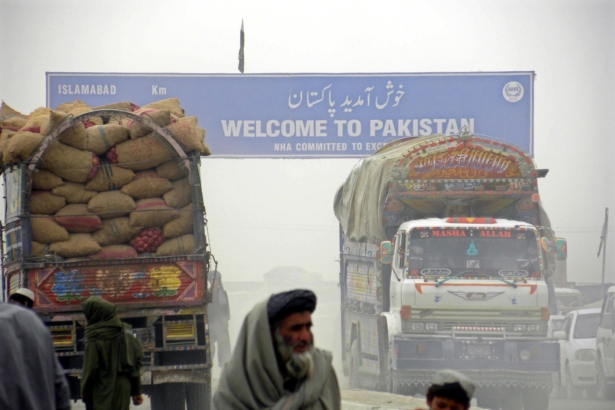Review of Afghanistan developments
Following the prolonged closure of Pakistan’s borders with Afghanistan and the suspension of both exports and imports, the Taliban administration has ultimately resolved to sever trade ties with Pakistan. Mullah Abdul Ghani Baradar, the Deputy Prime Minister for Economic Affairs, urged Afghan entrepreneurs and industrialists to explore alternative trade routes in the region rather than relying on Pakistan. Additionally, he requested that Pakistani drug importers terminate their trade relations with Pakistan within a three-month timeframe.
This article explores the motivations, prospects, and obstacles associated with the Taliban government’s historic choice to terminate trade relations with Pakistan.
Factors leading to the termination of trade partnerships
1- Pakistan’s utilization of trade routes as a means of political leverage
The political tensions that exist between Pakistan and Afghanistan have their origins in history, tracing back to the Cold War era in the region. Historical records indicate that since that time, Pakistan has employed border closures as a means to exert pressure on Afghanistan, a practice that persists to the present day.
Notwithstanding the Afghanistan-Pakistan Trade and Transit Agreement (APTTA), Pakistan frequently shuts its borders during periods of political unrest with Afghanistan. This action adversely affects Afghan traders, who rely on access to Pakistani borders for exporting their goods to South Asian markets.
Following the military conflict between the two nations last month, Pakistan has closed all its borders with Afghanistan, a situation that remains unchanged. This ongoing strategy by Pakistan, particularly over the past four years, has ultimately prompted the Taliban government to make a decisive move to sever trade relations with Pakistan, demonstrating a firm resolve to put an end to this ongoing situation orchestrated by Pakistan.
2- The accessibility of alternative destinations for Afghanistan
Following the rise of the Taliban government, Kabul implemented a foreign policy focused on economic development and initiated a concerted effort to enhance trade relations with neighboring countries. The significant number of trips undertaken by trade and economic officials of the Taliban government to various nations serves as a clear indication of this initiative. Consequently, this endeavor has fostered a form of economic and trade competition among regional countries in Afghanistan, resulting in a broader array of trade partners for the nation. As a result, the landscape of Afghanistan’s trade partnerships has experienced notable transformations. The presence of Central Asian countries has become increasingly significant, and even nations from the Caucasus have begun to engage in trade and investment activities within Afghanistan.
On the other hand, in contrast to earlier decades, the Torkham crossing in Pakistan has lost its former strategic significance for Afghanistan, as new trade routes, particularly railways, have emerged.

This is the reason Mullah Baradar stated in his remarks that Afghanistan currently possesses alternatives and is no longer reliant on a single nation. It appears that Kabul has established a dedicated account for trade partners, including Central Asian nations, India, and Iran, along with trade routes, particularly the Chabahar port.
Immediate effects of severing trade ties with Pakistan
Severing Afghanistan’s trade ties with Pakistan, although it may yield beneficial long-term outcomes, will result in immediate, temporary repercussions. This disruption in trade relations could lead to challenges in sourcing and substituting essential goods that were formerly imported via Pakistan. The process of finding replacements may prove to be both expensive and protracted. Conversely, reducing imports from Pakistan could lead to an increase in the prices of certain goods, particularly if alternative transportation routes are lengthier or if the cost of goods in the originating countries exceeds that of Pakistan. Afghanistan might require a phase of economic restraint.
This decision could also present security and political challenges for Afghanistan. While the Pakistani Defense Minister has claimed that severing Afghanistan’s trade ties with Pakistan will decrease border traffic between the two nations and thereby enhance Pakistan’s security, it is probable that Pakistan will interpret this action by the Taliban as a move towards self-isolation and will respond accordingly on both security and political fronts.
Long-term opportunities
Despite the constraints and immediate challenges, severing trade ties with Pakistan may serve as a catalyst and a crucial achievement for Afghanistan’s economy, politics, and commerce. Initially, by exploring alternative trade options, Afghanistan will significantly lessen its reliance on Pakistan and effectively terminate Pakistan’s strategic manipulation of border closures.
Secondly, Chabahar Port presents a distinctive opportunity for Afghanistan and is expected to garner significant attention from Kabul, Delhi, and Tehran in the near future. By channeling its goods through Chabahar Port, Kabul will enhance the importance and viability of this route as an alternative to Karachi Port. The Afghan government’s initiative to establish a second land route at the Milk border with Iran represents progress in this regard. Afghanistan is obligated to invest in the operationalization of this route.
Thirdly, Afghanistan’s trading partners are set to become more varied. Over the past few decades, Afghanistan’s trade has primarily centered on Iran, Pakistan, and India. The forthcoming circumstances will encourage both the government and Afghan traders to explore other nations and new prospects.
Fourth, this transformation will undoubtedly compel Afghanistan to broaden its trade framework, create and enhance new customs procedures, and improve road and rail networks, which will represent a beneficial advancement for Afghanistan’s conventional system.
Fifth, a variety of trade destinations and routes will enhance Afghanistan’s resilience against political and security fluctuations in adjacent regions.
Related Articles
Proxy Warfare: Analyzing India and Pakistan Blasts
The future of Afghanistan and Pakistan tension
Conclusion
Considering Pakistan’s historical trade relations with Afghanistan, the Taliban government’s choice to sever trade connections with Pakistan seems to be a calculated strategy. This action reflects Afghanistan’s resolve to diminish its reliance on Pakistan and to counter Islamabad’s influence over its economy and trade.
In order for this policy to be successful, Afghanistan needs to promptly and effectively establish alternative routes; invest in logistics and customs infrastructure, assist Afghan traders on these new routes, focus on short-term cost management, and offer concessions to the sponsoring nations.
The effective execution of this policy has the potential to lead Afghanistan towards economic self-sufficiency and enhanced regional power.

















